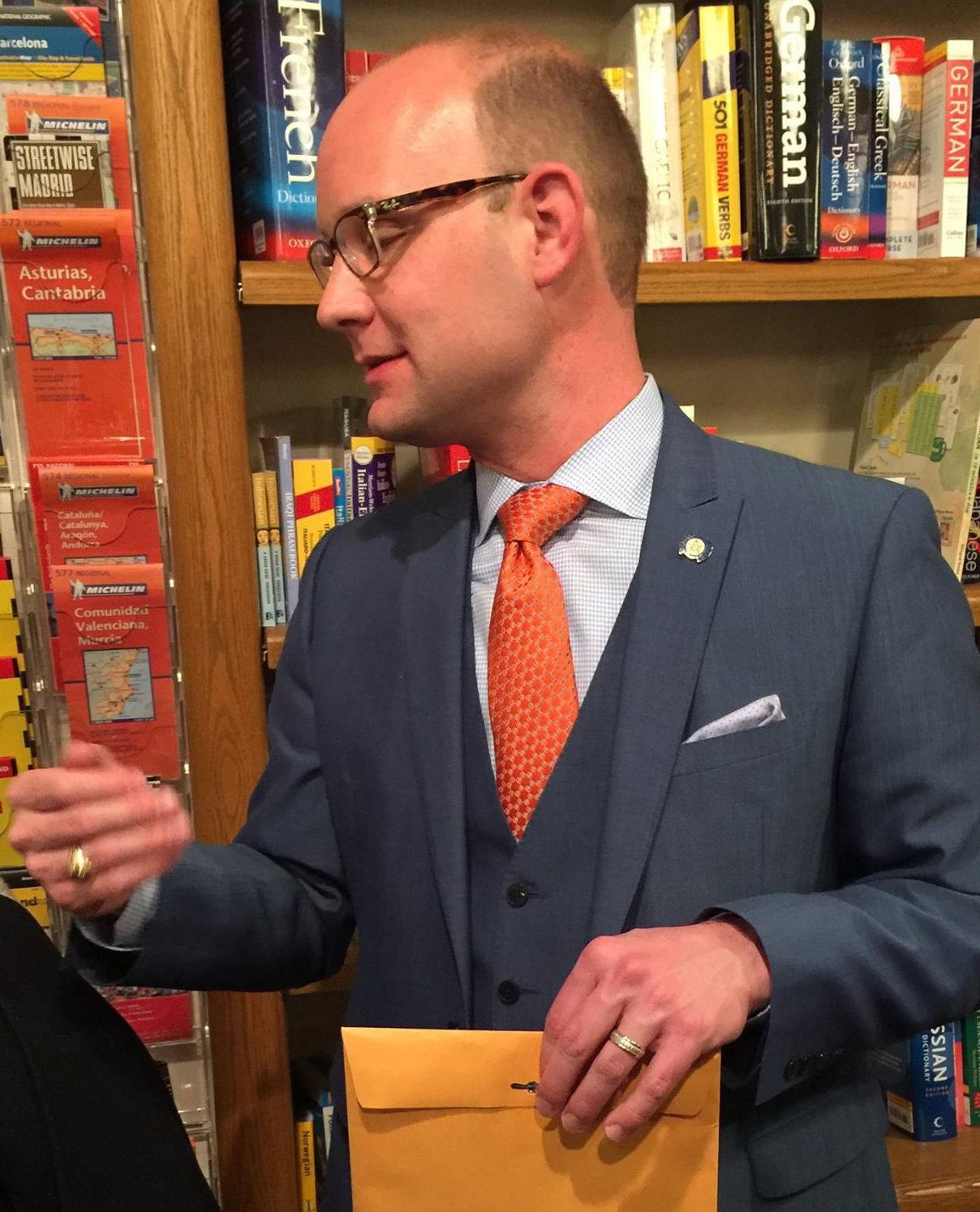BY MIKE W. RAY
 When it convenes to begin work on Feb. 6, the state Legislature will be confronted with yet another massive budget shortfall.
When it convenes to begin work on Feb. 6, the state Legislature will be confronted with yet another massive budget shortfall.
The combination of persistent revenue shortages and constant budget cuts dominated the first Oklahoma Observer Newsmakers program of 2017, which was moderated by Arnold Hamilton and featured state Rep. Scott Inman. Hamilton is the owner/editor of The Observer, and Inman, D-Del City, is the Minority Leader in the Oklahoma House of Representatives. The event was held Thursday evening at Full Circle Bookstore in Oklahoma City, with 135 in attendance.
This year’s legislative session will be “all about money,” Hamilton predicted, and asked Inman, “Success or failure of this session depends on what?”
The last six to eight years “have been some really challenging times” in Oklahoma, Inman replied. During his first term in the Legislature [2007-08], he said, “We had a billion-dollar surplus.” In contrast, 2017 will be the third consecutive year the state has experienced a severe budget shortage: at least $868 million this year [and perhaps as much as $960 million or more], $1.3 billion last year, and $611 million in 2015.
“The single greatest issue is whether we can pay our bills,” Inman said. Oklahoma “for the last six to eight years has not paid its bills.”
The Republican-controlled Legislature has chipped away at agency budgets in recent years.
As an illustration, the state Department of Veterans Affairs has been cut by about 23%, Inman said. Core services of state government have been “decimated,” he said. More than half of all appropriated state agencies – 39 of 73 – have experienced budget cuts of 20% or more since FY 2009.
EDUCATION BUDGETS SLASHED
Even though virtually everyone agrees that a well-educated workforce is essential to sustain a prosperous economy, public schools in Oklahoma have been cut by 23.6%, more than any other state in the nation. Last year the Legislature reduced Higher Education’s budget by almost 17%, and Career and Technology Education was cut by 12.5%.
The budget of the State Department of Education has been reduced in four of the last nine years. The agency’s $2.426 billion appropriation for FY 2017 is $105 million less than the $2.531 billion the agency was appropriated nine years ago, in 2009, House Fiscal Division ledgers reflect.
Meanwhile, enrollment in public schools has grown by 48,000 students over the last eight years: from 644,754 in school year 2008-09 to 692,670 in school year 2015-16, an average increase of 6,000 students per year during that period. Conversely, per-pupil expenditures have declined 8.6% since 2010 relative to increasing enrollment, records show.
When Hamilton asked whether a teacher pay raise is conceivable this year, Inman answered, “I think there’s a chance for a $1,000 pay raise, but the devil is in the details.” With a budget hole approaching $1 billion, the likelihood of a significant pay raise is “pretty slim.”
SCHOOL ADMINISTRATION EXPENDITURES LIMITED BY LAW
Hamilton mentioned the contradiction between the Republican mantra of “local control” and GOP efforts to limit salaries of school superintendents across the state and to force smaller school districts to consolidate.
Compulsory consolidation of school districts is a political “third rail,” Inman observed. He also pointed out that school districts are limited by law on the amount they can devote to administration, including principals as well as the superintendent. Districts with fewer than 500 students are capped at 8% of the total school budget; schools with 501 to 1,500 students are limited to 7%; and administrative expenses in districts with 1,500-plus students are capped at 5%.
“What’s offensive is trying to take that decision away from the local school board,” Inman asserted.
When asked about the status of school vouchers and school choice proposals, Inman said, “I think we still have the votes to defeat that, but each year we get closer” to its passage.
EVEN GOP CONCEDES ‘WE HAVE A REVENUE PROBLEM’
Gov. Mary Fallin and her Republican colleagues insisted for years that Oklahoma had “a spending problem,” Inman pointed out. Last year, though, she and her top executives conceded that “we have a revenue problem.”
“We have a structural budget deficit problem,” Republican State Treasurer Ken Miller said Thursday during the fourth annual budget summit sponsored by the Oklahoma Policy Institute. And David Blatt, executive director of the institute, projected that by 2030 the state budget deficit will soar to $2 billion “based on current policies.”
The GOP’s solutions last year for plugging the $1.3 billion budget gap, Inman recalled, included forcing all Oklahoma motor vehicle owner to buy a new license plate, which will produce $18.5 million, and cutting the earned income tax credit claimed by low-income working citizens, which will save the state treasury $29 million and will cost low-income working mothers an average of approximately $230 per year. “That was sinful, immoral,” Inman declared.
Meanwhile, the Republicans adamantly refused to delay or repeal the latest state income tax cut, which carved $150 million more annually from the state treasury. Repeated cuts to the income tax – from 7% down to 5% – have sheared $1 billion out of the state treasury.
The Republicans also have spurned efforts to index the gross production tax to the market price of oil, which would increase the levy as crude oil prices rise and lower the tax when the price of oil declines.
FINANCING GOVERNMENT VIA FEES AND DEBTS, NOT TAXES
Instead, the GOP continues to balance the state budget “on the backs of poor folks and retirees,” from one-time sources of revenue such as agency fines and fees, and with “a credit card,” Inman charged.
Last year, for example, Republican legislators approved $200 million worth of bonds for transportation improvements, which freed up cash that was used for other needs but created a long-term debt. More of the same is anticipated this year, Inman said ruefully.
In a related matter, Inman was asked about the impact of SQ 640, which voters statewide endorsed in a March 1992 special election. The constitutional amendment requires any state tax increase to be approved by either a statewide vote of the people, or by approval of three-fourths of both the House of Representatives [76 of the 101 members] and the Senate [36 of the 48 members].
No major tax increase has been enacted in Oklahoma in the nearly 25 years since SQ 640 was adopted, and Inman told the questioner that there’s “not enough sentiment” to repeal the stricture.
HEALTH CARE IN OKLAHOMA IS PRECARIOUS
Turning to the subject of health care, Inman was queried about the possibility that a cigarette tax increase will be resurrected this year.
House Democrats supported the proposed $1.50 per pack increase last year so long as it was directly tied to expansion of the state Medicaid program that serves low-income citizens.
Since 2011, nine Oklahoma hospitals have filed for bankruptcy, two have closed down, and two provide physician/diagnostic services only but no in-patient care nor emergency room services, according to Rick Snyder of the Oklahoma Hospital Association.
Just when it appeared that an agreement was about to be reached last year on the cigarette tax, former U.S. Sen. Tom Coburn and the right-wing Oklahoma Council of Public Affairs expressed their opposition. Subsequently, Republican legislators shifted tactics and proposed boosting the tobacco tax but depositing the extra money in the state’s General Revenue Fund. As a result, House Democrats locked up against the proposed tax hike and it died.
Inman said he told Fallin, who refused to expand Oklahoma’s Medicaid program, “We’re here not because cigarettes are too cheap but because too many Oklahomans are uninsured.”
CRIMINAL JUSTICE REFORMS APPROVED
On another matter, Inman said that although Fallin almost certainly will claim criminal justice reform as a signature achievement during her tenure in the governor’s office, it was House Democrats, not Republicans, who “pushed it across the finish line.”
Although the Legislature passed, and voters statewide endorsed, a package of reform measures last year, the changes are not retroactive, which explains why Oklahoma’s prisons are “chock full” today, Inman explained. He told the audience that Republican Gov. Frank Keating was the driving force behind enactment of legislation that requires certain criminals to serve 85% of their prison sentences before they can be considered eligible for parole. As a direct result, Oklahoma became “tough on crime” rather than “smart on crime,” Inman said.
TERM LIMITS HERE TO STAY; 2018 ELECTION EYED
In response to another question, Inman said there’s little chance that 12-year legislative term limits will be repealed any time soon, if ever. Term limits, which Oklahoma voters imposed by constitutional amendment in 1990, have cost the Legislature “institutional memory” and have increased the power of lobbyists and staff members. In addition, because they’re term-limited, legislators are not held accountable for the laws they propose and pass, Inman said. “It’s a horrible system.”
When asked about the national political scene and whether he intends to run for governor in 2018, Inman said that Donald Trump “may be the greatest thing that’s happened to the Oklahoma Democratic Party in a long time.”
He noted that Republican Frank Keating was elected governor two years after Bill Clinton was elected president; Democrat Brad Henry was elected governor two years after George W. Bush became president; and Republican Mary Fallin was elected two years after Barack Obama was first elected president.
“I spent the better part of the last year traveling around the state,” talking to voters and political figures, Inman said. He said he’s “giving it strong consideration” and expects to make a decision “within a few months.”
– Mike W. Ray is media director for the state House Democratic Caucus. This posting originally appeared on his Facebook page.







